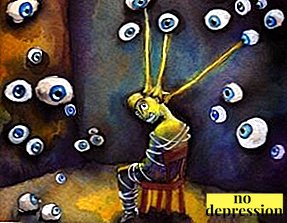Hospice nurses often have to listen to the confessions of people of different social status, status and age. One of the most bitter regrets: "I have too rarely expressed my feelings towards others." Why do we fear the conviction of strangers? Why do we drive ourselves to such a state when we stop feeling something? Why do not dare to confess in love, apologize or talk about their pain? To help you learn everything about a life filled with emotions, we have found interesting information about a new concept - emotional intelligence.
Little about emotional intelligence
We have 2 minds: one thinks, the other feels. When a person is overwhelmed with emotions, the intellect becomes useless. Emotions need to be controlled and distinguished. And yes, they are quite trainable.
Concept emotional intelligence they introduced ubiquitous sellers in order to adapt to the emotions of buyers, to convince them and get benefits. When psychology took up emotional intelligence, research went beyond the boundaries of business training, but its definition still remains controversial. Scientists are investing in the rational concept of intelligence.
Moreover, it was so rational that they were able to digitize it and place it in artificial intelligence, which no one would dare to compete with. Emotions - exactly what we (for now?) "Jumped around" robots. They make it possible to create art of all kinds, create, and not create copies.
No one comes into the world with formed scientific knowledge. Emotional intelligence, as well as education can be developed. In a world where many are concerned about the level of their IQ (knowledge index), the ability to feel, experience, express and interpret emotions plays an increasing role. But one concept does not replace the other. It is important not to oppose emotions to the intellect, but to find a reasonable balance between them. Or build a harmony between the mind and heart.
Emotionally we stay at the age when our parents disliked us.
In infancy we get all the care and love that our mom and dad are capable of. But closer to school, parents are more interested in not our experiences, but our successes. Of course, they still love their children, but sometimes they stop expressing it. Therefore, 20, 30, and 40 year old “children” are often found, who are afraid of failures, lose self-control, are not confident in the love front, as teenagers and are still waiting for praise, like elementary school students.
In articles with the analysis of sessions of psychologists There are interesting examples of psychological "stuck" at one age. For example, a forty-year-old woman (long and successfully married) admitted that she was afraid of condemnation of teenagers. In high school she was considered "plain woman", for which she received her portion of overt contempt of peers. She felt this fear of condemnation of her appearance until she understood at a psychologist's reception: she was already suitable for high school students in her mother and they even didn’t even laugh at her. Although, there are also opposite situations when the idols of school parties seek for admiration and recognition all their lives.
What is the result? Adults, people for decades experience teenage emotions. Outwardly, they change, but at the level of feelings, they still experience that period of life. Such immaturity is dangerous for two reasons:
- Emotions that are not consistent with age, poison life. In the case of negative experiences, the person subconsciously experiences an awkward situation. If an adult is constantly striving to experience vivid emotions from childhood, he is not able to rely on mature relationships or an adequate perception of himself from other people.
- Such people are easy to manipulate. After all, to force a teenager or a child to perform something is easier than an accomplished, thinking person. Surrounding people who could feel weakness (sometimes even subconsciously) do not miss the chance to use the situation to their advantage. This is how sellers, partners and colleagues work.
How to proceed?
People live for years without asking this question, as they are accustomed not to notice their own feelings. So, if the question of "obsolete" emotions turned out to be spoken out loud - this is half the battle. It is necessary to seek help from a psychologist, unleash and survive the situation until the end, find out your painful point, so as not to allow yourself to be manipulated. There is an important stage ahead in working with children’s or teenage emotions: the need to make a leap from that age to our own, present. But the feeling of relief obtained after realizing it is worth it.
Emotional ages of every age
Many have probably heard about the division into periods of human life and age crises. Sometimes these ages pass unnoticed. In some cases - violently. Then it happens and the "devil in the rib" and "berry again" "(youth after 40 years), or vice versa, old age captures a person who has not even reached 30 years old. Vigorous transitions from age to age are often called crises. They pass painfully not only for humans , but also for his environment.
Psychologists say that every age has its own division into ages (all numbers are conditional). Do not believe it? Try to remember yourself on the day of the 30th anniversary: insecurity, surprise, anxiety - all this we experience in infancy. We do not know how to live on and do not know life itself. By the age of 35, many people refer to their age philosophically, because they have reached maturity at this stage of life, and closer to the 40th anniversary - they feel like wise old men, and are afraid of “old age” or another anniversary. But this day comes, a person, as if he begins to live again, is reborn and re-experiences infancy, adolescence, maturity and old age.
It turns out that different ages not only set the rhythm of our lives, but also help us expand our emotional outlook to understand the actions of others. The most important thing in life is that each person is expected by several emotional “forks”. Understanding this cyclicality will help to show wisdom: keep the family and establish contact with loved ones, balance relationships in the team and support friends in difficult days. The young enthusiasm of the second youth will help to admit into their lives young people, the peers of their children. And they will learn to use a computer and register in social networks.
How to proceed?
Kayfovat from his age and replace in mind the concept of "age crisis" to "age of growth." To reconcile with any age, you need to learn to pass all its stages with dignity. Then you can take your future, take care of it, subdue your fears, believe in yourself, and say the phrase “life is just beginning” at the age of 30, 40, 50 and 60 with full knowledge of yourself.
People often confuse the concept of "owning feelings" and "suppress". And still continue to divide into right or wrong. Getting to know your emotions will help you learn everything about life here and now and enjoy it to the fullest. At any age.



